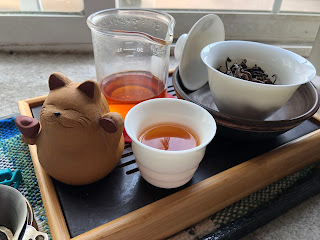Texture and Cha Qi: Check -- High Mountain Red Ai Lao Mountain Black Tea Spring 2019
This tea is part of a large order I put in with Yunnan Sourcing back in September 2019 and received in November. Since it's the American Thanksgiving Holiday this week, I took this week off to get some personal work and tea tasting done!
Tea: High Mountain Red Ai Lao Mountain Black Tea Spring 2019
Merchant: Yunnan Sourcing
From their website:
High mountain tea grow at 2000 meters on Ai Lao Shan in Zhenyuan area of Simao. Picked and processed only from the first flush of spring this black tea is lightly oxidized and processed similiar to Taiwanese black tea or Wu Yi Rock tea. There is a still a greenish tinge left to the leaves! The brewed tea is rich and thick with hints of dried Longan fruit with a protracted mouth feeling!
The tea is grown at almost 2000 meters making it one of the highest black teas we offer. Mr. Guo was born and raised in central Taiwan and his father had a black tea factory there. Mr Guo, traveled to Thailand and eventually decided on Yunnan. He was always a big Pu-erh tea fan and decided to spend time learning about Ai Lao area pu-erh since it's one of the remotest and untouched places in all Yunnan. He met many local pu-erh growers and worked with one in particular (Mr. Feng) to introduce a Taiwanese style processing which marries black tea and oolong in a sweet and fruity style!
Early March Harvest!
Overview
This is an interesting tea. The flavors are fairly subtle, balanced, and not one note seems to stand out, but it has a lot of texture and cha qi. When I brewed this a little hotter / longer, the tea is all about the texture. I could feel the astringency on the tongue, roof of the mouth, on the lips, with a puckering sensation. In conjunction with the astringency, the cha qi on this tea is fairly strong. In the second infusion, there was a tingling in my eyes, from the top of my head to the back, and on the lips...like when I have a really good tai chi session.Side Notes: probably good for grandpa brewing.
Brewing
I brewed this GongFu style with 5.10 grams of tea in a porcelain gaiwan.The tea broth has an interesting texture primarily due to the astringency factor in the tea. It feels very viscous on the tongue but drinks smoothly. I could feel the astringency on the tongue, roof of the mouth, on the lips, with a puckering sensation. In conjunction with the astringency, the cha qi on this tea is fairly strong. In the second infusion, there was a tingling in my eyes, from the top of my head to the back, and on the lips...like when I have a really good tai chi session.
However, I can’t seem to discern the actual flavors in this tea. There’s a strong flavor initially that evens out. All the flavors are subtle but fairly well balanced. This isn't a bad thing, as I feel that this tea is all about the texture, astringency, and cha QI.
- Leaf: Long wiry
- Smell of Leaf (Dry): Cooked tomatoes, sweet, mild roast
- Smell of Leaf (in Warm Gaiwan): Stewed tomatoes
- Brew Times (seconds) / Temp (F): 10s/202F, 30/199, 40/195, 50/205, 60/199, 120/200, 5min/200
- Color: Medium orange amber
- Leaf Aroma: Leaf aroma changes slightly with each step. But in general:
- (high) stewed tomatoes, cooked veggies (maybe squash?) -- this turns to a sweet, fruity scent in later infusions
- (low) marinara sauce (1-2) with the tomatoes & herbs, mild roast, roasted veggies, nuts (#3)
- Liquid Aroma: The aroma is like a very mild sweet honey with marzipan
Cost-Wise
This is a fairly inexpensive tea. I purchased 50grams of this tea at $6.00 USD, bringing the cost to about $0.12 USD / gram.Conclusion
Overall, I'm not sure how I feel about this tea. I like the texture, astringency, and the very strong cha qi! The flavors are non-descript, but if you're looking for a flavorful tea, I don't recommend this tea to you.I'm hoping that this tea begins to open up its flavors in the upcoming months.


Comments
Post a Comment